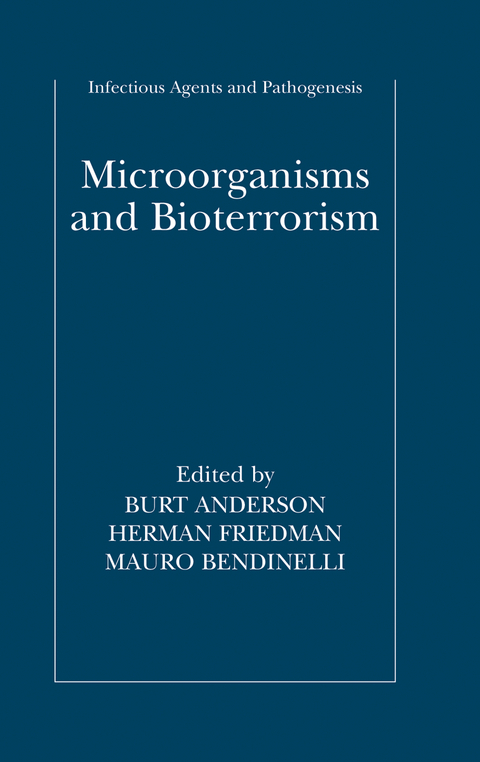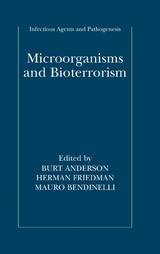Microorganisms and Bioterrorism
Seiten
2006
Springer-Verlag New York Inc.
978-0-387-28156-8 (ISBN)
Springer-Verlag New York Inc.
978-0-387-28156-8 (ISBN)
Aims to bring together information concerning microbes with potential as bioterrorist weapons. This work is useful for microbiologists, including bacteriologists, virologists and mycologists, in academia, government laboratories, and research institutes, public health physicians, researchers and scientists.
The threat of bioterrorism has become a major challenge for the twenty-?rst century. However, the potentials of infectious agents as bioweapons have been recognized for centuries. Throughout history there have been attempts to i- tiate infectious disease outbreaks and epidemics during warfare. In the last decade the attention of the biomedical community, as well as governments and the United Nations, has increasingly focused on the threat of bioterr- ism, especially the use of biological and/or chemical weapons against military and civilian populations. As an example, there is now much interest conce- ing microbial infection and bioterrorism in the medical microbiology and - munologycommunities. Thisvolumeaddressessuchconcernsandemphasizes bothbasicandclinicalconcepts,aswellasproblematicimplicationsofinfection by various microbes now recognized as potential bioterrorism agents. The ?rst chapter by Drs. Andrew Canons, Philip Amuso, and Burt And- son from the University of South Florida is an overview of the biotechnology of bioterrorismbothinthepublichealthresponsetopossibleactsofbioterrorism, aswellasfortheconcernsaboutthemisuseofbiotechnology.
Thesecondch- ter is a historical perspective of microbial bioterrorism by Dr. Steven Morse, Director of the Bioterrorism Division at the Center for Disease Control and Prevention in Atlanta, GA. This chapter describes in detail historical aspects concerning the early use of biological agents in warfare, development and international conventions to prohibit the use of such weapons, and a brief - scription of important incidents of infectious agents as bioterrorist agents and use during the last few centuries. The next chapter by Dr. Sandra Gompf from the University of South Florida discusses the role of public health physicians and infectious diseases specialists in the control of microbial bioterrorism.
The threat of bioterrorism has become a major challenge for the twenty-?rst century. However, the potentials of infectious agents as bioweapons have been recognized for centuries. Throughout history there have been attempts to i- tiate infectious disease outbreaks and epidemics during warfare. In the last decade the attention of the biomedical community, as well as governments and the United Nations, has increasingly focused on the threat of bioterr- ism, especially the use of biological and/or chemical weapons against military and civilian populations. As an example, there is now much interest conce- ing microbial infection and bioterrorism in the medical microbiology and - munologycommunities. Thisvolumeaddressessuchconcernsandemphasizes bothbasicandclinicalconcepts,aswellasproblematicimplicationsofinfection by various microbes now recognized as potential bioterrorism agents. The ?rst chapter by Drs. Andrew Canons, Philip Amuso, and Burt And- son from the University of South Florida is an overview of the biotechnology of bioterrorismbothinthepublichealthresponsetopossibleactsofbioterrorism, aswellasfortheconcernsaboutthemisuseofbiotechnology.
Thesecondch- ter is a historical perspective of microbial bioterrorism by Dr. Steven Morse, Director of the Bioterrorism Division at the Center for Disease Control and Prevention in Atlanta, GA. This chapter describes in detail historical aspects concerning the early use of biological agents in warfare, development and international conventions to prohibit the use of such weapons, and a brief - scription of important incidents of infectious agents as bioterrorist agents and use during the last few centuries. The next chapter by Dr. Sandra Gompf from the University of South Florida discusses the role of public health physicians and infectious diseases specialists in the control of microbial bioterrorism.
Biotechnology and the Public Health Response to Bioterrorism.- Historical Perspectives of Microbial Bioterrorism.- The Infectious Disease Physician and Microbial Bioterrorism.- Modulation of Innate Immunity to Protect Against Biological Weapon Threat.- Smallpox: Pathogenesis and Host Immune Responses Relevant to Vaccine and Therapeutic Strategies.- Bacillus anthracis: Agent of Bioterror and Disease.- Tularemia Pathogenesis and Immunity.- Brucella and Bioterrorism.- Pneumonic Plague.- Coxiella burnetii, Q Fever, and Bioterrorism.- Genomic and Proteomic Approaches Against Q Fever.- Rickettsia rickettsii and Other Members of the Spotted Fever Group as Potential Bioweapons.
| Reihe/Serie | Infectious Agents and Pathogenesis |
|---|---|
| Zusatzinfo | 14 Illustrations, black and white; XX, 240 p. 14 illus. |
| Verlagsort | New York, NY |
| Sprache | englisch |
| Maße | 155 x 235 mm |
| Themenwelt | Natur / Technik ► Fahrzeuge / Flugzeuge / Schiffe ► Militärfahrzeuge / -flugzeuge / -schiffe |
| Naturwissenschaften ► Biologie ► Mikrobiologie / Immunologie | |
| Sozialwissenschaften ► Politik / Verwaltung | |
| ISBN-10 | 0-387-28156-8 / 0387281568 |
| ISBN-13 | 978-0-387-28156-8 / 9780387281568 |
| Zustand | Neuware |
| Haben Sie eine Frage zum Produkt? |
Mehr entdecken
aus dem Bereich
aus dem Bereich
von der Machtergreifung bis zur Gründung der Vereinten Nationen
Buch | Softcover (2023)
Motorbuch Verlag
CHF 38,90




